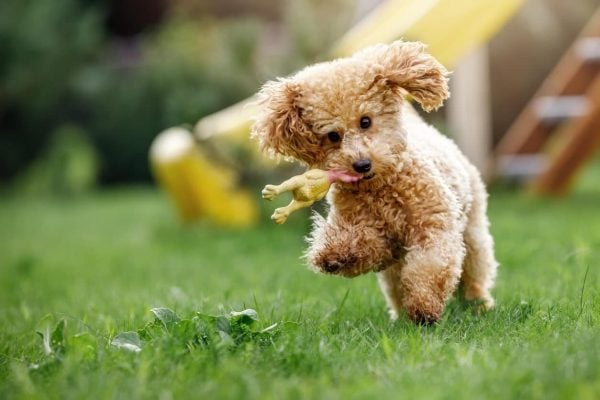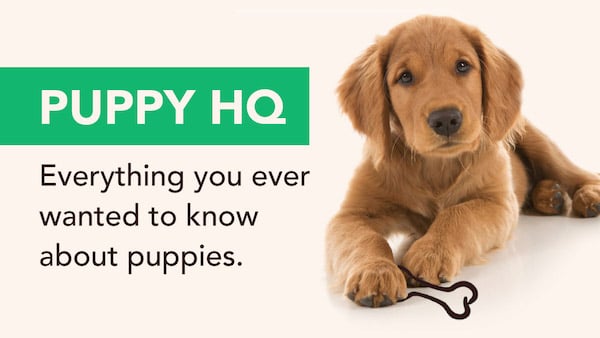- Not a substitute for professional veterinary help.
With their adorably long legs and curly coats, Standard Poodle puppies are a lot smaller and fluffier than their adult counterparts. Plenty of loving care will help them grow up into intelligent, athletic, and affectionate companions.
If you’re planning to add a Standard Poodle puppy to your family, plan to spend anywhere from $1,000 to $2,000. Puppies bred for competition or showing can cost $3,000 or more.
Here’s everything you need to know about this charismatic, curly-coated breed before bringing a new puppy home.
Key Standard Poodle Puppy Facts
- Litter size: Standard Poodle litters usually range from six to nine puppies.
- Popularity: Standard Poodles aren’t a common sight at the dog park, but they’re becoming more popular. In 2024, they ranked 7th on Rover’s list of top trending dog breeds.
- Puppy weight: Standard Poodle puppies typically weigh 11 to 16 pounds at 10 weeks old—when they’re ready to go home with you!
- Puppy temperament: These pups have an intelligent and sensitive nature, and they thrive with plenty of positive reinforcement and consistency.
- Energy levels: Standard Poodle puppies are full of energy and need plenty of physical exercise and mental stimulation.
- Maturity: Standard Poodles reach maturity around age 2 or 3. By this time, they’ll weigh 40-70 pounds and stand at least 15 inches tall at the shoulder, although they can grow to be as tall as 27 inches.
- Unique traits: “Standard Poodle puppies love to chew,” explains Bekky Schramm, AKC registered Standard Poodle breeder at Boodle’s Poodles. “It’s a good idea to invest in high-quality chew toys.” She adds that new pet parents should make training and socialization top priorities to help prevent challenges in the first year.
- Bonding likelihood: Standard Poodles typically bond with all members of the family, although they may have one favorite person they naturally gravitate toward.
Where To Find Standard Poodle Puppies
If you’re ready to start your search for a Standard Poodle puppy, you have three main options:
Rescue groups
You can adopt from breed-specific national groups like Standard Poodle Rescue as well as regional groups like Mid-Atlantic Poodle Rescue and Carolina Poodle Rescue.
Since Standard Poodles are a trending breed, puppies tend to be rare at rescue centers. You’re more likely to find adult dogs whose previous guardians underestimated their intelligence and energy.
Show breeders
The American Kennel Club and The Poodle Club of America both have lists of approved breeders.
Before choosing a breeder, do some research and ask questions! Good questions to ask include:
- Can I meet both parent dogs?
- Have the puppies received health testing?
- How do you prepare puppies for their new homes?
Online marketplaces
You might also see puppies advertised on online marketplaces like Good Dog or through Facebook. Just keep in mind that some of these listings may be from backyard breeders or puppy mills, so check out the seller carefully for red flags, like very low prices, no health testing, and frequent availability of puppies.
Recommended health tests
Before committing to a puppy, it’s important to find out their vaccination history, the health history of both parent dogs, and any breed-specific health tests.
The Poodle Club of America and Orthopedic Foundation for Animals (OFA) recommend these tests for Standard Poodles:
- Hip dysplasia evaluation: Standard Poodles are prone to hip dysplasia. An evaluation by OFA or PennHIP checks the health of their hips and joints.
- Eye examination: Standard Poodles can develop progressive retinal atrophy (PRA), an inherited condition. It’s important to make sure your puppy gets an eye exam from an ophthalmologist certified by the American College of Veterinary Ophthalmologists.
- Health elective: Standard Poodle puppies should also get at least one elective test, including a thyroid evaluation, a Sebaceous Adenitis (SA) evaluation, a basic cardiac exam, or an advanced cardiac exam.
Because Standard Poodles can develop inherited health conditions, you’ll want to ask breeders if they’ve done genetic tests on the parent dogs.
Genetic tests should be done by a specialist lab like UC Davis Veterinary Genetics Laboratory or OptiGen. Home DNA test kits like Embark can provide some genetic information, but these tests don’t replace genetic health testing from a specialist.
Standard Poodle Puppy Physical Characteristics
Standard Poodle puppies might be small and fluffy, but they grow into large adult dogs.
As your puppy matures, it’s important to adapt your training, socialization, and dog-proofing to match their new abilities and size!
| Age | Approximate height (inches) | Approximate weight (pounds) | Tips |
| 8 weeks (2 months) | 4 in-5 in | 11 lbs-16 lbs | Start socialization and gentle training sessions. |
| 12 weeks (3 months) | 5 in-6 in | 17 lbs-26 lbs | Offer plenty of high-quality chew toys as puppies start to chew. Focus on potty and crate training. |
| 18 weeks (4 months) | 6 in-7.5 in | 26 lbs-40 lbs | Start dog-proofing any higher areas, like counters. Maintain a consistent training routine. |
| 26 weeks (6 months) | 7.5 in-8.5 in | 40 lbs-55 lbs | Introduce longer walks and maintain a consistent training routine with plenty of mental stimulation. |
Raising a Well-Adjusted Standard Poodle Puppy
Standard Poodles are incredibly smart, so they need a lot of training and socialization.
“They can get bored and restless if they don’t have things to satisfy their demand for mental stimulation,” Schramm says.
These tips can help set you and your pup up for success.
Breed-specific training needs
Standard Poodles are extremely intelligent, but also have a sensitive side. Schramm recommends using positive reinforcement techniques and focusing on socialization and early foundational training.
Standard Poodles are typically easy to train and ready to please, but that also means they’re always ready for action! Providing a blend of physical activity and mental enrichment will help challenge their bodies and minds.
Their intelligence also means Standard Poodles can pick up bad habits fast, so if necessary, work with a professional for a tailored training plan.
Potty training
Standard Poodles are typically easy to potty train, but it may take up to six months for new habits to stick. Follow a consistent routine, with lots of praise when they do their business outside and let you know they want to go out.
Lifestyle exercise and activities
Standard Poodles have almost boundless energy and enjoy a wide range of activities.
“Swimming, dog sports, and scent detection are all good options for this active, energetic breed,” says Ivan Petersel, Certified Professional Dog Trainer-Knowledge Assessed and founder of Dog Virtuoso.
They also tend to strong bonds with their pet parents. As a result, they prefer homes where there’s usually someone around. Early training can help them feel comfortable being left home alone for short periods, but pay attention to early signs of separation anxiety.
Socialization
Early socialization is crucial for sensitive breeds like the Standard Poodle. Breeders will typically start the socialization process, so ask for details about what that involves.
“I focus on things like early neurological stimulation, early scent introduction, sound exposure, introductions to new people and other pets, car rides, crate training, leash training, grooming, and getting used to little kids,” Schramm explains.
Once you bring your puppy home, build on those early skills with additional adventures designed to introduce your Standard Poodle to a wide range of experiences.
Poodles typically love people, and as the largest of this breed, the Standard Poodle tends to be more patient and less impulsive than their smaller relative, the Toy Poodle.
Grooming Routine for Standard Poodle Puppies
Most Standard Poodle pet parents choose to take their dog to a professional groomer for a puppy cut or other style every six weeks. It’s essential to get your puppy used to grooming from a young age. This makes it more likely they’ll enjoy the process rather than find it stressful.
Standard Poodle puppies have slightly straighter hair than adult Poodles, so it can be easier to manage. As they mature, their hair will become more curly, giving them the classic Poodle look.
Health Considerations
Poodles are typically healthy, but they do have a higher risk of some health conditions, according to Dr. Jen Wormleighton, veterinarian and head of veterinary services at Animal Friends Pet Insurance. These conditions include hip dysplasia, progressive retinal atrophy (PRA), and Addison’s disease.
As a large, deep-chested breed, they can also be prone to bloat, so it’s important to recognize the signs of bloat and learn how to prevent it.
To reduce the likelihood of bloat, Schramm recommends pet parents get into the habit of letting their dog rest after they’ve eaten.
To keep your Standard Poodle as happy and healthy as possible, annual vet check-ups are essential. It’s also a good idea to get pet insurance in case of any accidents or injuries.
Standard Poodle Puppy Essentials Checklist
“Standard Poodles are known for being intelligent, loving, and eager to please their humans,” Schramm says.
As you get ready to bring your adorable new puppy home, it’s important to prepare the essentials:
- Puppy food: Choose a large-breed puppy food so your Standard Poodle gets all the nutrition they need for strong growth. If you’re not sure which brand to choose, ask your vet for advice.
- Gear: Make sure your puppy has a collar and tag with all their details. For training sessions, choose an adjustable harness to accommodate growth spurts.
- Crate: If you’re crate training your puppy, choose the right size of crate and follow a daily crate training schedule designed to build positive associations.
- Toys: Standard Poodle puppies love to chew, so high-quality, durable chew toys are a must. A few puzzle toys can also help stave off boredom and provide mental stimulation.
- Training: Standard Poodle puppies love learning new things, but also need regular socialization. Puppy training classes can check both of these boxes! Working with a certified trainer for one-on-one classes can also help with any specific issues.






